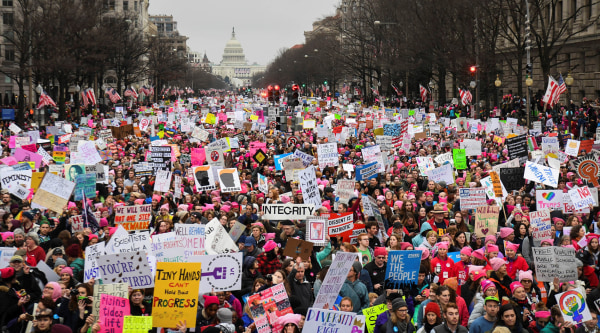In this year-end news analysis, MSNBC anchor Stephanie Ruhle describes the differing perspectives on the concept of justice that drove the politics of 2017.
This year, Americans across the political spectrum rose up in record numbers to achieve their idea of justice.
Just one year ago, Donald Trump was elected to serve as the 45th president of the United States. For many Americans who considered themselves forgotten, this was a long-awaited moment, especially for working-class voters who previously did not see their values reflected in their leaders, or had not seen their wages increase, or felt ignored on issues like immigration and trade. Many formerly apolitical Americans were fed up with the system and the dysfunction of Washington gridlock.

Enter Trump, an unfiltered “business celebrity” who promised to be hard on crime and big on business if elected. He said he would finally drain the swamp that big government had become. This was a day of reckoning for politics as the country knew it, as the self-proclaimed “silent majority” — particularly in the Rust Belt — would overtake a system that had failed them time and again. For them, justice would finally be served.
Trump wasted no time addressing them, either: In his inauguration speech, the president pledged to transfer power from Washington to the American people. That message, though, was interpreted in very different ways.
The disenfranchised, working-class voters who were championed by Trump pledged to stand by their president, no matter how unconventional his approach to the presidency. In their minds, he would bring their jobs back. He would increase their wages. He would serve them justice.
The left’s quest for justice, on the other hand, was fueled by Trump’s outrageousness. Their resistance grew stronger with each insult he made.
Immediately after Trump was sworn in, millions of people gathered across the nation to march for causes close to them: women’s rights, science, immigration rights and more. On Trump’s first full day as president, an estimated 2.6 million people gathered in cities all over the world to stand in solidarity for women’s and human rights, making it the largest demonstration for social justice in U.S. history. Over inauguration weekend alone, the American Civil Liberties Union received more than $24 million in online donations, six times the group’s usual annual amount.
And by the end of the month, after Trump announced the first version of his travel ban, the left erupted again, interpreting the executive order not as an aggressive approach to border security but instead as a racially motivated Muslim ban.
Tens of thousands of people stormed airports across America to chant and shout in opposition to the travel ban. In Washington, a Yemenite woman held a sign that read “I spit in Trump’s hummus.” In San Francisco, protestors joined by a brass band shouted, “Say it loud, say it clear, refugees are welcome here!” Their crushing loss on Election Day would not keep Democrats from seeking their version of justice.
Justice in its most literal form was a principal focus of the Trump administration this year. In 2017, Trump nominated 58 federal and appellate judges — mostly white, conservative men, following the example of his appointment to the Supreme Court, Justice Neil Gorsuch. For evangelical Christian voters, these appointments made for a hugely successful 2017.
While programs and policies matter, they change with every administration. Federal judicial appointments last a lifetime and affect nearly every facet of American life. For family-values voters, the potential for Trump’s judicial appointments to reverse landmark decisions, including Roe v. Wade, same-sex marriage and school prayer, carry much more weight than his brash and offensive rhetoric. Without these judicial victories, the GOP would be even more fractured than it is today, and Trump voters would have to stop rationalizing the divisive tweets of their president.
2017 was not only a year for justice-seeking on a political level, but also on a human level. The #MeToo movement inspired scores of victims of sexual misconduct to bravely come out of the shadows and tell their stories. In 2017, the underdogs found their voice, even as far as Capitol Hill, where misconduct allegations led to multiple resignations by both Democrats and Republicans. Sen. Kirsten Gillibrand, D-N.Y., who called on the president to resign because of the misconduct allegations against him, informed Trump and America that “we will not be silenced” after he insulted her on Twitter.
In recent years before Donald Trump, Election Day was Justice Day. Your vote was your vehicle to seek justice, and if you didn’t get the result you’d hoped for, another election was not far behind. 2017 changed that. In 2017, each day after Trump came into office was an opportunity for justice — some working to achieve it, and some holding onto it for dear life.
*News Searching By nbc news*


























